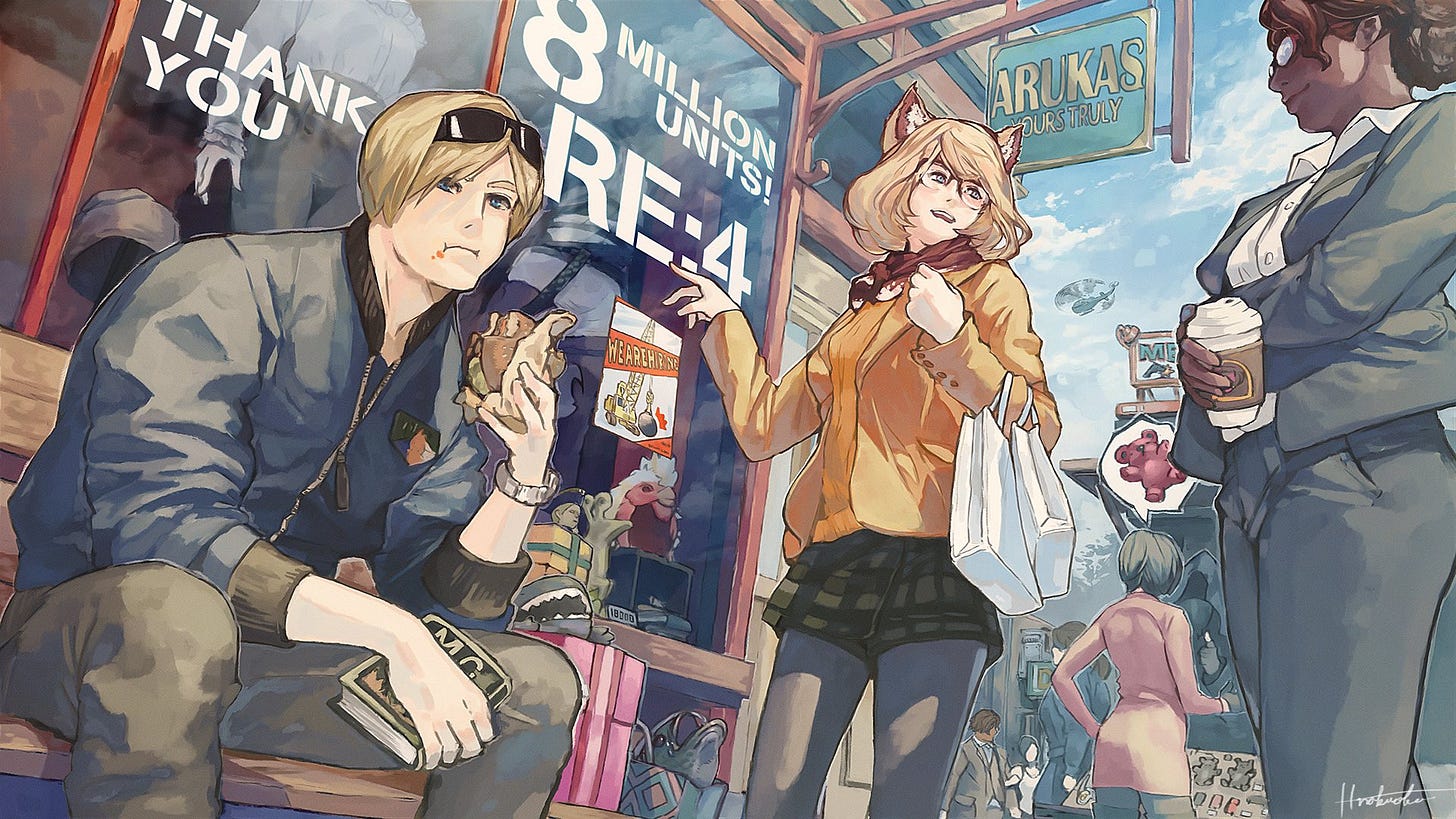Resident Evil's parallel means of reanimation culminated with Resident Evil 4 - what major elements will its next instalment draw upon?
Or, which mutation of the T-Virus will Capcom employ?
Today, replete with a cute illustration, Capcom announced their latest revision of a Resident Evil, né Biohazard title - the ubiqituous Resident Evil 4 - notched eight million sales to date. Debuting in March of 2023, the game received a universally astounding reception, evolving Capcom’s proprietary RE Engine to a sophisticated, yet tactile end. With regard to my own persona relationship to Leon’s Big Adventure, I regard it as perhaps the most complete experience of this generation; the team reconciled the tight dread of their Resident Evil 2 refurbish with the theme park thrill of Village in a medley of cackling madness. The episodic structure of the narrative respected the twisted fairytale fable with due humour, reminding the player that they are commandeering a gorier spin on Super Mario. Though the emphasis upon action presaged the franchise’s dire creative crisis in 2005, this iteration managed to honour the original’s integrity whilst expanding on its grizzlier elements.
Predicated upon the series’ contemporary model of alternating between reamkes and original entires - save for a successive speedrun through Raccoon City in our own time of plague - the next title is assumed to be Resident Evil 9. Furthermore, as the father’s story is done, one may conclude Ethan Winters will not return as a menacing mold of vengeance. The former may be slightly more educated than the latter: slyly, Metacritic published a page dedicated to Resident Evil 9 - curiously denoting its exclusive availability on the Xbox Series and the PlayStation 5. Granted, this should not be read as a measure of confirmation; Capcom are firmly focused upon ensuring Monster Hunter Wilds receives due attention in the zeitgeist. However, a dormant database submission from a reasonably valid authority - dubious nonetheless - perhaps illustrates the possilibity of an aperitief at the Game Awards prior to a full meal in 2025. Or, in forthright terms, Metacritic are simply predicting the Osakan studio’s next move, rather than responding to an official word. OpenCritic, moreover, does not have an accessible page on the title; it does have one on Resident Evil 5 with an oddly stretched image, nevertheless.
The illustration accompanying Capcom’s celebration of Resident Evil 4’s sales tally - significantly brighter than the game itself.
Since the series’ rejuvenation through the chilling Resident Evil 7: Biohazard, charmingly entitled Biohazard 7: Resident Evil in Japan, the franchise has slipped between timestreams with lucidity. Biohazard - the aforementioned, not the series writ large - introduced a novel first-person element, effectively implementing a please-rip-this-demonic-headset-off-me-right-now virtual reality component. In 2019, Resident Evil 2, a thorough revision of the PlayStation 1 carnival of pixelated panic, delivered a parallel experience: an over-the-shoulder inventory management simulator featuring a middle-management monster adept in interrupting your first day on the job. However, in a less sarcastic register, these two titles represented the innate dexerity of a franchise caught within the throes of competing masters: a gonzo film franchise bearing one cult masterpiece, a commercial desire to expand upon its best selling entry in Resident Evil 5, and obligatory efforts to cultivate an engaged audience through titles closer to its survival-horror lineage.
Indeed, the franchise’s longevity can be attributed to its versatility in theme. Though one may read the series as prestigious pulp eminently concerned with zombie menace, the biopunk cadence ensures no two storylines quite play the same notes. For instance, Village rips pages from the Brother’s Grimm, whereas Resident Evil 6 draws upon dinosaurs, reptiles, and masculine tension. Ultimately, the series’ eclectic tone, unified through a kindred thread of corporate mistrust, binds each episode in a manner akin to a venerable soap opera. Therefore, in meditating upon the possibilities of a ninth primary instalment, adorned in the paradox of its fourth entry following upon the strides of its eighth, how will Capcom chart this time vortex?
Resident Evil: Village’s cultural cachet grew expontentially thanks to Lady Dimitrescu - almost to her height.
Perhaps Capcom, as acolytes devoted to the dogma of their dragons, will continue to refine RE Engine’s burgeoning open-world faculties. DuskGolem, whose residency as a leaker of the series has reported on the development of remakes of Code:Veronica and Number:Zero, believes Resident Evil 9 will be in the philosophical vein of Monster Hunter Wilds and Dragon’s Dogma 2; Capcom are known to produce titles under the proviso of gameplay initiatives. Consequently, where Resident Evil 7, Resident Evil 2, and Devil May Cry V were tailored to refine the engine’s fluency in producing intimate, manicured environments, the aforementioned triptych will test its reach over expansive, yet detailed biomes. To indulge in parallel supposition, how will the series translate its haunted house sensibility to greater pastures? Village experimented in sequestering certain environments, encouraging players to act upon their sanctioned volition through its broader pathways. Conversely, Resident Evil 4’s serialised structure, breaking from Leon’s gaze to chart Ashley’s plight, prioritised a thoroughly orthodox form of narrative, uniformly unveiling its twist, turns, and bells.
To appropriately make its final etching into this generation’s typewriter, Resident Evil 9 should serve as a celebration of the RE Engine: the miracle resource that inspired Capcom’s creative ambition to - as the logo suggest - reach for the moon. Unifying its triumphs, from its sumptuously reactive physics to its considered, sublimely sculpted models, in the form of a multi-protagonist trek through an open-world synecdoche of contemporary Resident Evil may surfeit fans famished from a year without new content, whilst providing a neat point-of-entry to those intimidated by the series’ Tolstoyan breadth. However, I would kindly request an Alan Wake-style dance number featuring the main ensemble at some point - just a sprinkling of service for myself.



